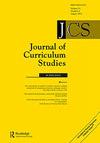在社会研究中教授和学习金融知识-如何实现课程目标和抱负的案例研究
IF 2
3区 教育学
Q1 EDUCATION & EDUCATIONAL RESEARCH
引用次数: 1
摘要
大多数突出的金融知识框架和课程主要侧重于简单资金管理的教与学。然而,今天对个人的财务要求包括更复杂的事情,如买房和为退休储蓄。此外,金融知识还引发了一些规范性问题,比如个人应该承担什么样的责任。在教育方面,这造成了一个一致性问题,即把金融知识作为大众教育的希望和期望没有得到理想的结果。本文利用已有的研究结果和强大的知识结构来讨论高中金融素养教育如何从纳入社会课程中受益,这是许多教育系统中现有的学校课程。研究发现,教师可以利用他们现有的教学能力来教授金融知识。然而,为了取得成果,课程和教学大纲都必须引导教师放弃对资金管理的关注,而是把重点放在教学生有关影响个人财务的金融、经济和政治问题上,但同时也会受到民主决策的影响。本文以强大的金融素养为概念,讨论了金融素养教学与学习的意义。本文章由计算机程序翻译,如有差异,请以英文原文为准。
Teaching and learning financial literacy within social studies – a case study on how to realise curricular aims and ambitions
ABSTRACT Most salient financial literacy frameworks and curricula mainly focus on teaching and learning of simple money management. However, the financial demands placed on individuals today include much more complicated matters, such as buying a home and saving for retirement. Furthermore, financial literacy gives rise to normative questions such as what responsibility should be placed on individuals. In educational terms, this creates an alignment problem where the hopes and expectations placed in financial literacy as mass-education is not met by desirable results. This article uses previous results and the construct of powerful knowledge to discuss how financial literacy education in upper secondary school can benefit from an incorporation into social studies, which is an existing school subject in many educational systems. Findings include that teachers can utilize their existing teaching competence to also teach financial literacy. However, to accomplish results, both curricula and syllabi must guide teachers to abandon the focus on money management to instead focus on teaching students concerning the financial, economic and political issues that affect personal finances, yet at the same time can be affected by democratic decisions. Implications for financial literacy teaching and learning are discussed using the concept Powerful Financial Literacy.
求助全文
通过发布文献求助,成功后即可免费获取论文全文。
去求助
来源期刊

Journal of Curriculum Studies
EDUCATION & EDUCATIONAL RESEARCH-
CiteScore
4.70
自引率
4.80%
发文量
19
审稿时长
24 weeks
期刊介绍:
Journal of Curriculum Studies publishes conceptually rich contributions to all areas of curriculum studies, including those derived from empirical, philosophical, sociological, or policy-related investigations. The journal welcomes innovative papers that analyse the ways in which the social and institutional conditions of education and schooling contribute to shaping curriculum, including political, social and cultural studies; education policy; school reform and leadership; teaching; teacher education; curriculum development; and assessment and accountability. Journal of Curriculum Studies does not subscribe to any particular methodology or theory. As the prime international source for curriculum research, the journal publishes papers accessible to all the national, cultural, and discipline-defined communities that form the readership.
 求助内容:
求助内容: 应助结果提醒方式:
应助结果提醒方式:


